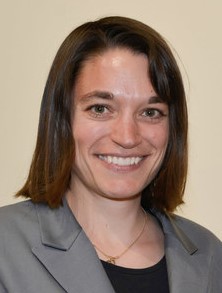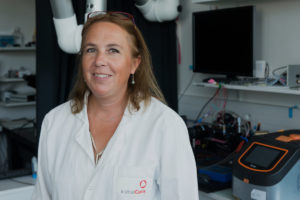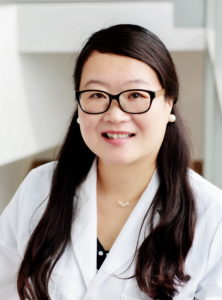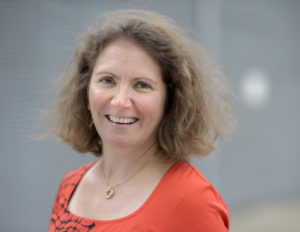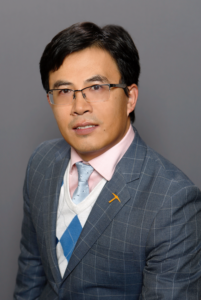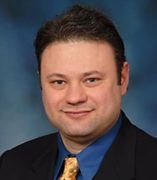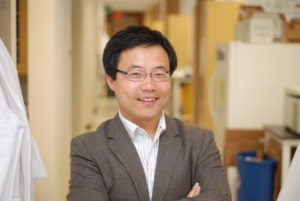Lab on a Chip is excited to introduce the newest additions to our Advisory Board!
Esther Amstad studied material science at ETH Zurich, Switzerland, where she also carried out her PhD thesis under the supervision of Prof. Marcus Textor (2007-2011). Her thesis was devoted to the steric stabilization of iron oxide nanoparticles. As a Postdoctoral fellow, she joined the experimental soft condensed matter group of David A. Weitz at Harvard University, USA (2011-2014). She developed new microfluidic devices to study early stages of the crystallization of nanoparticles, and to produce drops of well-defined sizes at high throughputs. Since June 2014, she is Tenure Track Assistant Professor at the institute of Materials at Ecole Polytechnique Fédérale de Lausanne (EPFL), Switzerland, where she heads the Soft Materials Laboratory (SMAL). Inspired by nature, her research team develops drop-based processing routes that offer control over the local composition and structure of materials to fabricate adaptable, self-healing materials.
Stephanie Descroix is team leader at Institut Curie, France. Her group is interested in the development of microfluidics for biomedical applications and more recently in organ on chip development for biophysics and biology. She has an initial background in biochemistry and obtained her PhD in Analytical Chemistry in 2002. She was hired a CNRS researcher at ESPCI (Paris) in 2004 to develop microfluidic device for bioanalytical application. In 2011, she joined the lab PhysicoChemistry Curie at Institut Curie to benefit from a unique interdisciplinary and clinical environment. Since 2013, she is head of the CNRS French Micro and Nanofluidic Network (GDR MNF) and she is co-founder of INOREVIA company.
Mei He is an Assistant Professor at the University of Kansas, USA. She received her PhD degree from the University of Alberta with Professor Jed Harrison, and postdoctoral training from the University of California, Berkeley with Professor Amy Herr. Dr. He Received NIH Maximizing Investigator’s Research Award for Early Stage Investigators (MIRA ESI) and LOC Emerging Investigator in 2019. She also received an Lab on Chip Outstanding Reviewer award for the year of 2018. One of her publications received the 2018 SLAS Technology Readers Choice Award. Her research interests include biomedical microfluidic devices and sensing approaches, 3D biomaterials, and nanodelivery, employed in programming and monitoring biomimetic immunity associated with extracellular vesicles.
Michelle Khine is Professor of Biomedical Engineering at University of California, Irvine, USA. Prior to UC Irvine, Khine was an Assistant and Founding professor at UC Merced from 2006-09. At UC Merced, Shrink Nanotechnologies Inc., the first start-up company from youngest UC campus, was spun out of the research developed in Khine’s lab. Her current research projects include: single cell electroporation, shrinky-dink microfluidics, microsystems for stem cell differentiation, canary-on-a-chip and quantitative single-cell analysis of receptor dynamics and chemotactic response on a chip.
Wilbur Lam MD, PhD is a physician-scientist-engineer trained in clinical pediatric hematology/oncology as well as bioengineering. He is the W. Paul Bowers Research Chair, Associate Professor of Pediatrics and Biomedical Engineering at Emory University School of Medicine and the Georgia Institute of Technology, and an attending physician at the Aflac Cancer and Blood Disorders Center of Children’s Healthcare of Atlanta. His laboratory focuses on developing microfluidic and microfabricated systems to study, diagnose, and even treat hematologic diseases including sickle cell disease, thrombotic/bleeding disorders, and leukemia.
Severine Le Gac is Professor at the University of Twente (The Netherlands), where she leads a group called Applied Microfluidics for BioEngineering Research (AMBER). Séverine Le Gac holds her Engineer degree from the ESPCI (Ecole Supérieure de Physique et de Chimie Industrielles) and her MSc degree from the National Museum of Natural History (both Paris, France). In 2004, she obtained her PhD degree cum laude from the University of Lille (France). After a short visit at the University of Tokushima (Japan), she joined the University of Twente in 2005 as a post-doctoral researcher, before being appointed as a tenure-tracker in the same university. Professor Le Gac is member of the director board of the Chemical Biological Microsystem Society (CBMS). Her research focuses on the use of miniaturized devices for biological and medical applications, and in particular for cancer research and the field of assisted reproductive technologies.
Xiujun (James) Li is Associate Professor at the University of Texas at El Paso, USA. Prior to University of Texas at El Paso, Professor Li was a NSERC Postdoctoral Fellow at UC Berkeley working with Richard A. Mathies and a NSERC Postdoctoral Fellow at the Harvard University & Wyss Institute for Biologically Inspired Engineering, working with Professor Whitesides. Professor Li has received various awards including the 2018 Outstanding Faculty Dissertation Research Mentoring Award, UTEP, the 2017-2018 Outstanding Efforts Award, UTEP and a 2017 Innovation Center Proof-of-Concept Grant, Medical Center of the Americas Foundation (MCA). Professor Li’s research focusses on bioanalysis, biomedical & environmental applications, and catalysis using microfluidic lab-on-a-chip platforms and nanotechnology.
Ian Papautsky is Richard and Loan Hill Professor at the University of Illinois at Chicago, USA and Co-Director of the NSF Center for Advanced Design & Manufacturing of Integrated Microfluidics. The Papautsky lab is focused on innovating blood analysis technologies, using microfluidics and sensing, for precision and point-of-care medicine. The Papautsky lab also pioneered the inertial microfluidics technology for label-free isolation and analysis of rare cells. The Papautsky lab has recently focused on capture and molecular profile analysis of circulating tumor cells (CTCs) and circulating tumor microemboli (CTM), whose molecular profile can provide a “cancer census” that is more holistic representation of disease state and active pathophysiology.
Weian Zhao is an Associate Professor at the Sue and Bill Gross Stem Cell Research Center, Chao Family Comprehensive Cancer Center, Department of Biomedical Engineering, and Department of Pharmaceutical Sciences at University of California, Irvine. Dr. Zhao is also the co-founder of Velox Biosystems Inc, and Amberstone Biosciences Inc, start-up companies that aim to develop technologies for rapid diagnosis and immunotherapeutic discovery, respectively. Dr. Zhao’s research aims to 1) elucidate and eventually control the fate of transplanted stem cells and immune cells to treat cancer and autoimmune diseases, and 2) develop novel miniaturized devices for early diagnosis and monitoring for conditions including sepsis, antibiotic resistance and cancer. Dr. Zhao has received several awards including the MIT’s Technology Review TR35 Award: the world’s top 35 innovators under the age of 35 and NIH Director’s New Innovator Award. Dr. Zhao completed his BSc and MSc degrees in Chemistry at Shandong University and then obtained his PhD in Chemistry at McMaster University in 2008. During 2008-2011, Dr. Zhao was a Human Frontier Science Program (HFSP) Postdoctoral Fellow at Harvard Medical School, Brigham and Women’s Hospital and MIT.
Recent Publications in Lab on a Chip by our newest Advisory Board members
Biočanin, M, Bues, J.Dainese, R. Amstad, E., Deplancke, B.
Lab Chip, 2019, 19, 1610-1620
Scalable production of double emulsion drops with thin shells
Vian, A., Reuse, B., Amstad, E.
Lab Chip, 2018, 18, 1936-1942
Ferraro, D, Serra, M., Filippi, D., Zago, L., Guglielmin, E., Pierno, M., Descroix, S., Viovy, J.-L., Mistura, G.
Lab Chip, 2019, 19, 136-146
Zhu, Q., Hamilton, M., Vasquez, B., He, M.
Lab Chip, 2019, 19, 2362-2372
Microfluidic on-demand engineering of exosomes towards cancer immunotherapy
Zheng Zhao, Jodi McGill, Pamela Gamero-Kubotac and Mei He.
Lab Chip, 2019, 19, 1877-1886
Wearable sensors: Modalities, challenges, and prospects
Heikenfeld, J., Jajack, A., Rogers, J., Gutruf, P., Tian, L., Pan, T., Li, R., Khine, M., Kim, J., Wang, J., Kim, J.
Lab Chip, 2018, 18, 217-248
Hardy, E.T., Wang, Y.J., Iyer, S., Mannino, R.G., Sakurai, Y., Barker, T.H., Chi, T., Youn, Y., Wang, H., Brown, A.C., Lam, W.A.
Lab Chip, 2018, 18, 2985-2993
Beekman, P., Enciso-Martinez, A., Rho, H.S., Pujari, S.P., Lenferink, A., Zuilhof, H., Terstappen, L.W.M.M., Otto, C., Le Gac, S.
Lab Chip, 2019, 19, 2526-2536
Size-dependent enrichment of leukocytes from undiluted whole blood using shear-induced diffusion
Zhou, J., Papautsky, I.
Lab Chip, 2019, 19, 3416-3426
Single stream inertial focusing in low aspect-ratio triangular microchannels
Mukherjee, P., Wang, X., Zhou, J., Papautsky, I.
Lab Chip, 2019, 19, 147-157
Chen-Yin Ou, Tam Vu, Jonathan T. Grunwald, Michael Toledano, Jan Zimak, Melody Toosky, Byron Shen, Jason A. Zell, Enrico Gratton, Timothy J. Abram and Weian Zhao
Lab Chip, 2019, 19, 993-1005
Functional TCR T cell screening using single-cell droplet microfluidics
Aude I. Segaliny, Guideng Li, Lingshun Kong, Ci Ren, Xiaoming Chen, Jessica K. Wang, David Baltimore, Guikai Wu and Weian Zhao
Lab Chip, 2018, 18, 3733-3749
We hope you enjoy reading this collection, which we have made free to access until the 15th March 2020 with an RSC Publishing Account.


